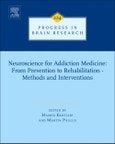Neuroscience for Addiction Medicine: From Prevention to Rehabilitation - Methods and Interventions is the latest volume from Progress in Brain Research focusing on new trends and developments in addiction research. This established international series examines major areas of basic and clinical research within neuroscience, as well as popular emerging subfields such as addiction. This volume takes an integrated approach to review and summarize some of the most recent progress from the subfield of addiction research, with particular emphasis on potential applications in a clinical setting.
Please Note: This is an On Demand product, delivery may take up to 11 working days after payment has been received.
Table of Contents
1. Animal Models for Addiction Medicine: From Vulnerable Phenotypes to Addicted Individuals 2. Animal Models of Drug Relapse and Craving: From Drug Priming-Induced Reinstatement to Incubation of Craving after Voluntary Abstinence 3. Computational Modeling for Addiction Medicine: From Cognitive Models to Clinical Application 4. Electrophysiology for Addiction Medicine: From Methodology to Conceptualization of Reward Deficit 5. Neurocognitive Rehabilitation for Addiction Medicine: From Neurophysiological Markers to Cognitive Rehabilitation and Relapse Prevention 6. Structural Imaging for Addiction Medicine: From Neurostructure to Neuroplasticity 7. Functional Neuroimaging for Addiction Medicine: From Mechanism to Practical Considerations 8. Resting State Functional Connectivity Analysis for Addiction Medicine: From Individual Loci to Complex Networks 9. PET Imaging for Addiction Medicine: From Neural Mechanisms to Clinical Considerations 10. Genetic Imaging Consortium for Addiction Medicine; from Neuroimaging to Genes 11. Human Pharmacology for Addiction Medicine: From Evidence to Clinical Recommendations 12. Emerging Targets for Addiction Neuropharmacology: From Mechanisms to Therapeutics 13. Cognitive Interventions for Addiction Medicine: Understanding the Underlying Neurobiological Mechanisms 14. Adolescent Psychotherapy for Addiction Medicine: From Brain Development to Neurocognitive Treatment Mechanisms 15. Cognitive Neuroscience of Cognitive Retraining for Addiction Medicine: From Mediating Mechanisms to Questions of Efficacy 16. Perspectives on Neurocognitive Rehabilitation as an Adjunct Treatment for Addictive Disorders: From Cognitive Improvement to Relapse Prevention 17. Noninvasive Brain Stimulation for Addiction Medicine: From Monitoring to Modulation 18. What the Alcohol Doctor Ordered from the Neuroscientist: Theragnostic Biomarkers for Personalized Treatments 19. What Does Addiction Medicine Expect from Neuroscience? From Genes and Neurons to Treatment Responses








